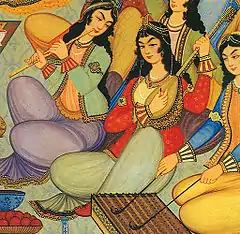Iranian hip hop
Iranian hip hop, also referred to as Persian hip hop,[1][2][3] refers to hip hop music developed in Iran (Persia).[4][5][6] It is rooted in American hip hop culture, but it has sometimes incorporated local elements such as Iranian classical music and literature.[7]
| Music of Iran | |
|---|---|
 | |
| General topics | |
| Genres | |
| Specific forms | |
| Ethnic music | |
| Other forms | |
| Media and performance | |
| Music festivals | |
| Music media |
|
| Nationalistic and patriotic songs | |
| National anthem |
|
| Other |
|
History
Iranian hip hop originates from Tehran, the country's capital city, although a number of experimental works were recorded earlier by diasporan Iranian musicians, particularly in Los Angeles.[8] Iranian rappers started out by recording mixtapes. Some combined hip hop with Iranian elements, such as Iran's classical music.[7] Hip hop music in Iran has often been an underground movement. On several occasions, recording studios have been shut down, websites have been blocked, and artists have been arrested.[9][10] Only a few works have been officially approved by the Ministry of Culture and Islamic Guidance.[11] Hip hop dance is also present in underground movements, with few performances having received limited permission.[12]
Iran's premier rap group, 021, named after the telephone area code of Tehran, was founded during the late 1990s.[6] Hichkas, the lead figure of this group, came to be one of Iran's earliest renowned rappers, and therefore nicknamed the Father of Persian Rap.[7] His well-received album Jangale Asfalt ("Asphalt Jungle"), produced by Mahdyar Aghajani, was the first Iranian hip hop album. It incorporated a fusion with traditional Persian harmonies and contributed remarkably to the evolution of hip hop in Iran.[7][13][14] The 021 music group was co-founded by the Yashar and Shayan duo, later renamed Vaajkhonyaa.[15][16]
Zedbazi, founded officially in April 2002, is regarded as the pioneer of gangsta rap in Iran.[9][10] The band quickly gained a huge popularity among the youth, due mainly to their use of explicit lyrics, littered with profanity and depictions of sex and drug use.[17] They are credited with starting a new movement in Iranian music.[18]
Bahram Nouraei, who was once arrested,[19][20] was listed as one of the "50 People Shaping The Culture Of The Middle East" by HuffPost in August 2012.[21] His most popular work, Inja Irane ("Here is Iran"), was described as a "poignant critique of the country" by Rolling Stone.[22]
Yas was the first Iranian rapper to be authorized to perform in Iran.[23][24] He reached national fame through his song CD ro Beshkan ("Break the Disk"), which was written about an Iranian actress who was subjected to a sex tape scandal. On 21 December 2011, he was chosen by voters as the "Artist of the Week" on MTV, entitled "Tehran's Hard-Hitting MC".[25]
The restrictions have been more stringent on women. Salome MC, who started her career collaborating with Hichkas,[6] was one of the first women to contribute to Iranian hip hop.[9][10][26] She was named as an influential and "revolutionizing" artist by MTV and Time.[27][28]
Samples
References
- Sadaghiyani, Shima (6 February 2017). "No one knows about Persian rap". The Michigan Daily.
- di Giovanni, Janine (16 August 2016). "Iranian Rap Music Flourishes Underground Despite Strict Religious Laws in Tehran". Newsweek.
- Haidari, Nilu (23 January 2017). "How Hip-Hop Connected the Iranian Diaspora and Taught Me to Swear in Farsi". Noisey.
- Arjomand, Noah (22 April 2010). "Rap in the Capital: Hip-Hop Tehran-Style". Frontline.
- "Why Iran is cracking down on rap music". The Daily Telegraph. 10 November 2010. Retrieved 24 February 2014.
- Dagres, Holly (6 January 2014). "Iran's thriving rap culture". Al-Monitor. Retrieved 24 February 2014.
- "پشت دیوار کیه؟ رپ ایرانی؟". Hamshahri (in Persian). Archived from the original on 17 July 2011.CS1 maint: unfit URL (link)
- "ریویل، رپ خون ایرانی در لندن" [Reveal, Iranian Rapper in London]. BBC Persian. 12 May 2006. Retrieved 6 May 2019.
- "Rebels of rap reign in Iran". SFGate. 16 April 2008.
- "Iran's 'illegal' rappers want cultural revolution". The Independent. 28 January 2008.
- "روزنامه اعتماد ملی 85/6/28 – رپ ایرانی ، صدای اعتراض نیست". Magiran.com. Retrieved 17 June 2015.
- "Iran's underground hip hop dance scene". France 24. 29 August 2013.
- Shahrad, Cyrus. "Hichkas the prophet of protest". Archived from the original on 14 May 2012. Retrieved 23 January 2019.
- "Social Networking Sites Aid Iranians Trying to Assert Identity". Voice of America. 14 June 2010. Retrieved 30 January 2019.
- "Hichkas on Sakkou" (in Persian). Sakkou. Retrieved 24 August 2017.
- "Vaajkhonyaa on PHH". ParsiHipHop.com. Archived from the original on 24 August 2017. Retrieved 24 August 2017.
- "Inside Iran's 'revolutionary' rap". Al Jazeera. 9 September 2014.
- Ahmadi, Ardeshir (director) (10 January 2014). Zedbazi Documentary (Documentary film). Tehran.
- "Bahram, An Iranian Rapper". WhatsUpIran.com. 10 September 2011. Archived from the original on 29 November 2016. Retrieved 9 April 2016.
- "Mideast Tunes Fall MENA Mix!". 15 September 2015.
- "50 People Shaping The Culture Of The Middle East". The Huffington Post. 9 August 2012.
- Ashcraft, Julie. "The Great Escape". Rolling Stone. Archived from the original on 24 February 2012.CS1 maint: unfit URL (link)
- Kimball, Cody (19 October 2008). "Iranian Rapper speaks of Peace at film screening". Western Herald. Retrieved 6 May 2019.
- Cherayil, Neena (26 March 2009). "Iranian Filmmaker Sarmast and Rapper YAS to Visit Campus". The Daily Gazette.
- Bondy, Halley (14 December 2011). "YAS: Persian Rap Royalty". Mtviggy.com. Archived from the original on 7 January 2012.
- Khaleeli, Homa (10 May 2011). "Salome: straight outta Tehran". The Guardian.
- "15 Rappers Who Kill It In Other Languages". MTV. 9 July 2015. Retrieved 28 June 2016.
- "World Rappers You Should Meet". Time Magazine. 12 July 2014. Retrieved 28 June 2016.